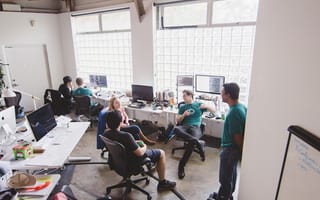What’s it like to be on the cutting edge of something big? Something really, really big?
Don’t look at us. We’re not the ones building cryptocurrency tracking systems or hyper-secure blockchain marketplaces. That said, we do know people who are — and we decided to ask them exactly that.
Here’s what head developers at three of LA’s most innovative tech companies told us about the problems they’re solving and the team culture that’s driving those solutions forward.
(In case you were wondering — they all happen to be hiring, too. What luck.)

TicketGuardian was built to give customers their money back for those concert tickets they didn’t end up using. Their technology and consumer-facing insurance products help provide platforms and organizers the control to drive additional revenue, improve their checkout flow and enhance fan engagement.
The company prides itself on employing people at all levels and providing team members with continuous learning opportunities to help them advance in their careers. That includes training, conferences and educational programs — to name but a few opportunities.
Here’s what TicketGuardian’s head of technology Patrick Zhang had to say about his team and their “#winning” culture.
We think differently, work differently, and succeed differently.”
What makes your developer team’s culture different from others in your space?
The team here at TicketGuardian is unbelievably supportive of each other and collaborative in a manner that would put most football teams to shame. We treat each other with great respect and get along exceptionally well (outside of the intense ping pong matches).
We’re an extremely driven team, made up of people from all different backgrounds and lifestyles. That type of diversity allows us to approach issues in a variety of ways — and in a way that a less diverse team wouldn’t be able to. We think differently, work differently, and succeed differently.
What problems are you solving and what technology are you using to do it?
TicketGuardian provides an embeddable insurance-as-a-service feature to ticketing platforms and fans on a massive global scale using elastic, highly scalable technology.
A common issue with large development teams and multiple concurrent feature sets is that a release takes longer and longer, and features being built cannot be released on a fast enough timetable, or at a reliable enough quality. Our team utilizes AWS, Docker, Terraform, Python, Django and modern component-oriented JavaScript frameworks to operate at a capacity that puts us on a fast track to develop features, iterate and deploy on a rapid schedule.

OPSkins is an online marketplace similar to eBay, only its users trade strictly in digital assets. Think virtual items in video games, like digital decals and stickers called “skins.” The company also incorporates blockchain technology in the form of WAX tokens, which allows users to trade those virtual items instantly and securely without leaving their game.
We caught up with WAX CTO Lukas Sliwka to get a glimpse into how the company creates and maintains their growing suite of products. Here’s what he shared about his developer team, remote work opportunities and the stack behind the game exchange.
We’ve learned how to create and manage full-stack delivery teams that focus on shipping value to our customers regardless of where team members are located.”
What makes your developer team’s culture different from others in your space?
Our engineering department is 100 percent geographically distributed, with people collaborating remotely from many different countries around the world. We have engineers working from the U.S., Canada, Argentina and Croatia, and we’re very good at effectively collaborating across these boundaries — whether cultural, geographical or simply a question of conflicting time zones.
We’ve learned how to create and manage full-stack delivery teams that focus on shipping value to our customers regardless of where team members are located. We focus on results while taking organization development to a new level.
What problems are you solving and what technology are you using to do it?
We are building a digital items marketplace platform that must withstand the transactional pressures of high-volume e-commerce, while utilizing blockchain technologies.
We apply high degree of automation, whether that’s to manage our cloud services or enable integration or load testing. Teams have high degree of freedom to innovate and get the job done. That said, most of our automation frameworks are developed using Golang, Java, Ansible and Terraform.
Our strategy is to deploy all functionality as isolated microservices, enabling our user community to build innovative solutions powered by our WAX Platform. Our blockchain team is using C++ to develop smart contracts and integrate WAX Connect services with the rest of the WAX Platform. WAX Marketplace and WAX Express Trade services are developed using PHP microservices powering React front-end.

Gem is out to change the way people look at cryptocurrency, and that’s not an easy task. The field is new. Knowledge about it is sparse. That’s why the company believes that learning and experimenting are of paramount importance — that curiosity is everything and egos should be checked at the door.
Here’s what the company’s senior systems engineer, Pete Wright, had to say about the culture behind the dev team at Gem.
One of our values is: Do the Essential. Anyone who has worked in a rapidly evolving industry like ours can attest to how important this is.”
What makes your developer team’s culture different from others in your space?
Several things make Gem unique, not only in the crypto-currency industry but in tech as a whole. We hold ourselves accountable to our company ideals across all teams and use them to ensure we’re staying focused.
One of our values is: Do the Essential. Anyone who has worked in a rapidly evolving industry like ours can attest to how important this is. By focusing on this value and living it, we’ve been able to create a culture where we focus on what our customers need — and since what they need may change over time, being able to deliver that experience seamlessly has been critical to our success.
What problems are you solving and what technology are you using to do it?
We’re building a user-centric mobile application that strives to make the process of diving into crypto a fun and easy process. That’s not something anyone else has really done before.
But to get to that place, there’s a lot of design and engineering work happening behind the scenes. This gets to another one of our cultural values: Craft an Experience. It’s a value our whole team has really bought into — we want to create something our users are going to love using both visually and functionally.
From a technology perspective, the app itself is primarily written in React Native. Our back-end services are a mix of Google Firebase various other services written in Java and Ruby.
Security is our number one priority, and that has become ingrained as a critical part of our culture. This ranges from basic “security hygiene” best practices that all employees follow, to constantly weighing the security implications of new features we add to the product, and making sure we are offering something that is both great to use but also done in a secure manner.
In the end, if users don’t feel they can trust us with their data, we’ve already lost the game.










